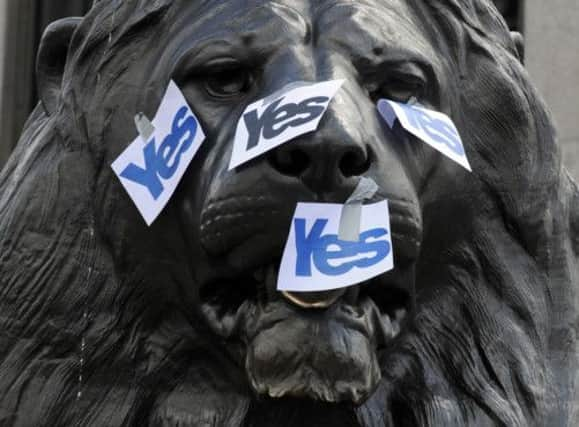Andrew Wilson: Listen to instincts on independence


Both men led their nations to a positive choice on independence. Despite the harsh privations and agonies many of their people contend with every day, it is not a choice they show any sign of wishing to reverse. Funny that.
There is a quote of Jinnah’s which I love. It could be the heart of a doctoral thesis on leadership or an entrance exam question to the best university in the world. It is: “I don’t believe in taking right decisions, I take decisions and make them right.” Discuss (12 million words).
Advertisement
Hide AdAdvertisement
Hide AdIt’s very good and gets to one of the core truths of life in this column’s much more humble experience. In life we make choices, some big some minute. In the making of them we set our course and whether they are the right or the wrong choice is, in the overwhelming majority of cases, singularly impossible to prove. Why? Because the counter-factual choice cannot be made in exactly the same circumstances because you chose a different one.
Therefore to waste energy on worry or regret is, to say the least, non-constructive. It is all about the next step.
Now obviously, some choices are clearly wrong or right. But mull it over with respect to your own life or view of the world and you will find these are in the minority. So to Jinnah’s point we have to weigh it up as best we can, listen to our instincts and our heart and, most importantly of all, get on with it.
Choice matters hugely, in fact it defines us. But what matters even more is the actions we take after our choice to make good the path we have selected to travel. Not for nothing do our marriage vows read “for better or for worse”, and the sentiment is true in work, in career, in policy, in most things. And with just over one year to go to a rather chunky sized choice for our small country we should reflect on this.
“Should Scotland be an independent country?” Most people right now don’t quite know what they think about this choice but they have a year to decide.
And this is truly a matter for all of us as a community of individuals. It is not something that “they” do or that will happen to us. It is our choice and that is the first step on any road to true self-determination.
Defining the starting point of what Scotland’s independence will look like will be the fascinating next stage of this journey. The building blocks are largely in place already and a Government White Paper will provide clarity and definition before the turn of this year.
Much will change fundamentally while much will stay the same. All independent countries are interdependent and some more so than others. It would make sense, would it not, if one of the oldest partnerships in the world was to evolve in a way that modelled harmony and sharing on 21st century terms, while anchoring the power to choose where it ought to reside, as close to the people as possible?
Advertisement
Hide AdAdvertisement
Hide AdSo, as I argued last week, if you are in the camp of wanting to see progress in this story, it is mission critical to campaign behind a unifying vision of the starting point the day after a positive result.
This doesn’t mean you want the journey to end there. As Donald Dewar said at the opening of the Parliament, this is a “journey without end”. But the idea that we can somehow get people to vote for a dozen different visions of the same thing is not anchored in political reality. Different ideas for different futures are for future democratic choices.
This time we will be asked to vote on a very modern 21st century reality about what a properly interdependent independent nation looks like. That has to be an exciting opportunity to demonstrate to the world how it can be done. Independence within a united kingdom with many ties that continue to bind, remains a wonderful platform for difference where it counts and unity where it’s needed.
It is about where our priorities lie for where we focus our energies in the short and medium term, and how we create a highest common denominator for progress that will get people to choose “yes”.
In my estimation the vision of independence in a continuing united kingdom will much more closely approximate “devo more/max/plus” than the stasis status quo of the same set of powers the Secretary of State for Scotland administered for decades. Devolution didn’t change them much.
But whatever we end up choosing and why we choose it, bear in mind the wisdom of another time and another place and determine to make right the choices we make and the decisions we take. This is about we not me, us not them. And that, in a way, is the single most important thing. «
Twitter: @AndrewWilsonAJW